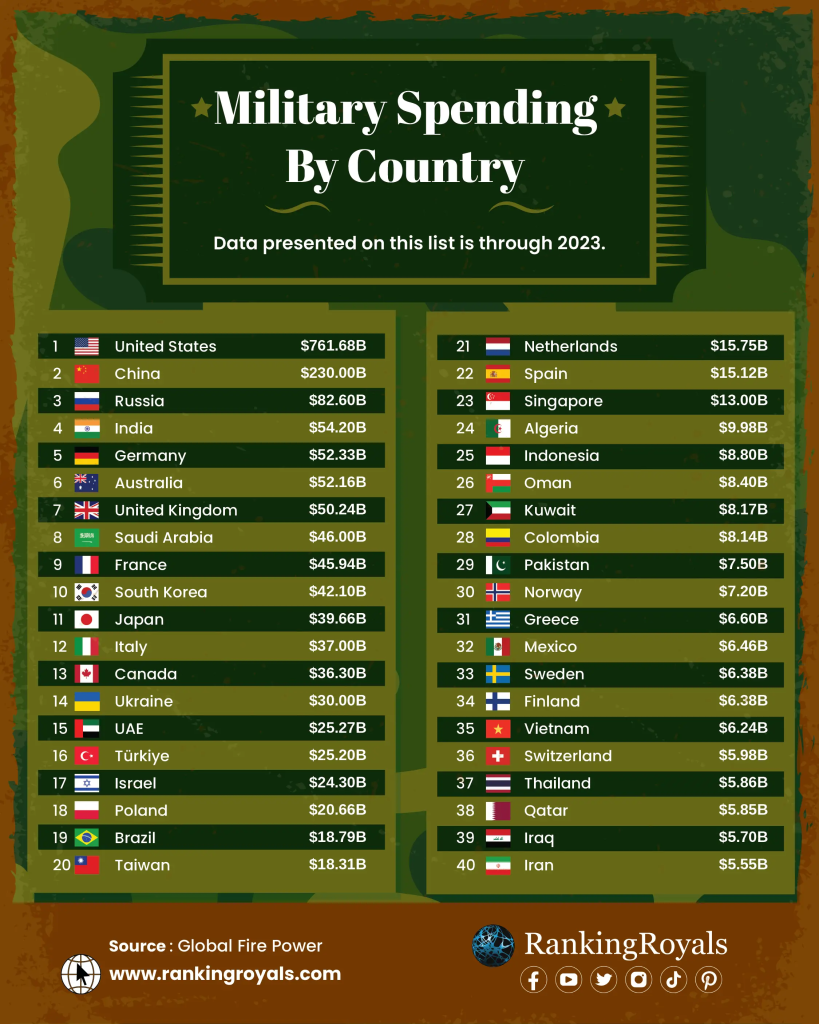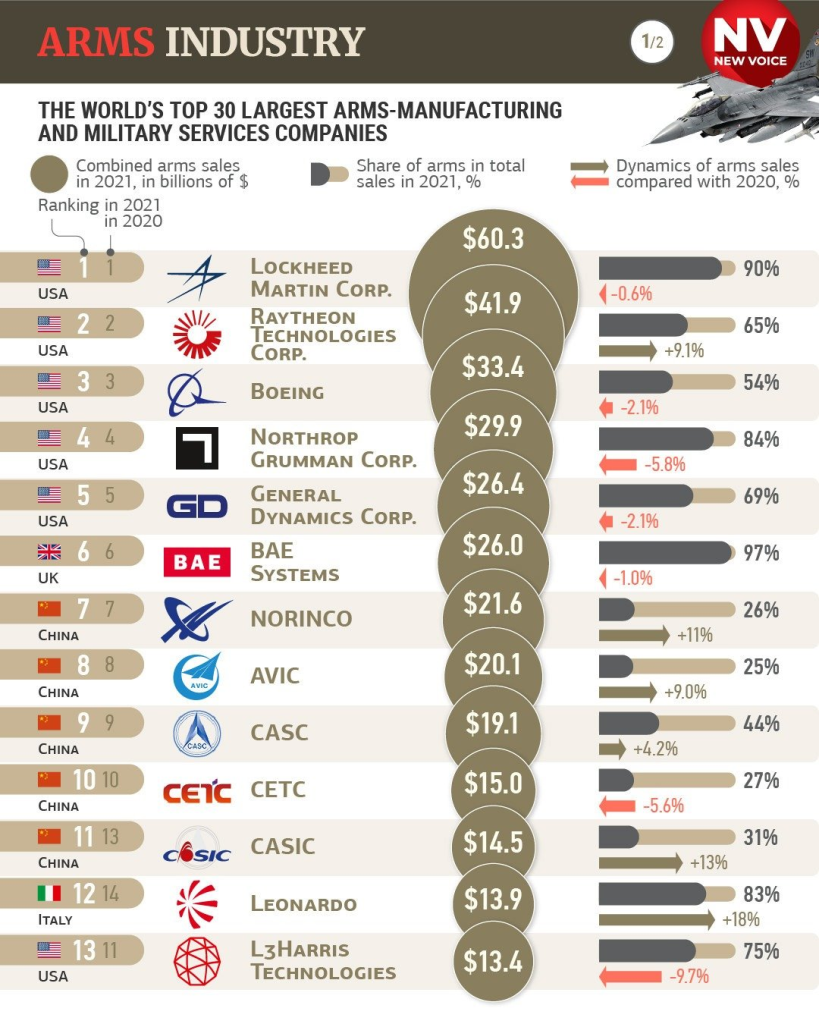War Economy: The concept of the military-industrial complex underscores the intricate relationship between the U.S. government, military establishments, and defense contractors, suggesting that there exists a powerful financial incentive to perpetuate conflict rather than seek peaceful resolutions. With vast sums of money allocated to defense spending, the USA has cultivated a complex ecosystem where various stakeholders profit from ongoing military engagements.
This dynamic, often termed the military-industrial complex, the interests of defense contractors, lobbyists, and certain government entities align more closely with the perpetuation of War rather than the pursuit of peace. As such, the USA has a significant financial stake in maintaining conflicts around the world, fueling skepticism about its genuine interest in seeking an end to war.
As the U.S. military-industrial complex expands, American defense giants are thriving amidst heightened government demand for military assistance to War in Ukraine and Israel.
With a significant portion of the 60.7 billion U.S. dollars allocated for Ukraine in a 95 billion supplemental defense bill set to flow back to the U.S. defense industrial base, major players in the sector are reaping the benefits. Industrial production within the U.S. defense and space sector has surged by 17.5 percent since the onset of the Russia-Ukraine conflict, as indicated by Federal Reserve data, War is big business.
“The Pentagon’s increased procurement of goods and services from U.S. defense companies has likely bolstered their potential profits,” remarked William Courtney, a retired U.S. ambassador and adjunct senior fellow at the RAND Corporation.
Financial reports for 2023 reveal robust sales figures for major U.S. arms dealers, with defense company Raytheon (RTX) reporting sales nearing 20 billion U.S. dollars in the fourth quarter alone, marking a 10 percent increase compared to the same period the previous year. Lockheed Martin’s stock price experienced a significant surge amid the Ukraine crisis, jumping from approximately 400 dollars per share to nearly 500 dollars per share in less than a year.
“Given the emphasis on ground operations, U.S. and other Western manufacturers of equipment, ammunition, and other supplies for ground forces, including ground-based air defenses like the Patriot system, may have seen the greatest benefits,” Courtney noted.
Additionally, the United States has capitalized on War with major arms deals, securing over 80 billion dollars in sales over the past year, with European allies contributing approximately 50 billion dollars. Notably, the U.S. remains Israel’s primary military aid provider, with American defense contractors such as Raytheon and Boeing supplying crucial weaponry and munitions to the Israeli military.
Lockheed Martin’s provision of “Hellfire” missiles to Israel underscores the depth of U.S.-Israeli defense cooperation. Bloomberg reports that during the conflict in Gaza, around 2,000 “Hellfire” missiles were expedited from the United States to Israel.
Since its inception in 1948, Israel has received over 130 billion dollars in security and weapon aid from the United States, with roughly 80 percent of its military equipment imports sourced from American suppliers.
Beyond arms sales, the United States has capitalized on War in the Russia-Ukraine conflict to drive up European demand for U.S. liquefied natural gas (LNG). Emerging as the largest LNG exporter to Europe, the U.S. has met the surging demand as European countries seek alternatives to Russian fuel. Over the past two years, more than 60 percent of U.S. LNG exports have been directed to Europe, further solidifying America’s position as a key energy supplier on the global stage.

War Companies: Top Defense Contractors Benefiting from Pentagon Spending
In the realm of defense contracting, certain companies stand out as major beneficiaries of Pentagon spending, securing lucrative contracts for a wide array of military projects. These companies play a pivotal role in supplying the United States Armed Forces with essential equipment, technology, and services. Let’s delve into some of the top defense contractors listed in the USA that receive the most Pentagon spending.
Lockheed Martin Corporation (NYSE: LMT): Lockheed Martin consistently ranks among the top defense contractors, receiving substantial Pentagon funding for its diverse portfolio of aerospace, defense, and security solutions. The company is renowned for its production of advanced aircraft, missile systems, cybersecurity solutions, and more. With a long history of supplying cutting-edge technology to the U.S. military, Lockheed Martin remains a dominant force in the defense industry.
Boeing Company (NYSE: BA): Boeing’s defense division is a key player in the defense contracting landscape, securing significant Pentagon contracts for a wide range of defense-related products and services. From military aircraft and rotorcraft to satellite systems and missile defense systems, Boeing delivers innovative solutions to meet the evolving needs of the U.S. Department of Defense (DoD). The company’s expertise in aerospace and defense technology positions it as a major beneficiary of Pentagon spending.
Northrop Grumman Corporation (NYSE: NOC): Northrop Grumman is a leading provider of defense and technology solutions, garnering substantial Pentagon spending for its contributions to national security. The company specializes in aerospace systems, cyber solutions, unmanned systems, and mission-critical electronics, among other capabilities. With a focus on innovation and advanced technology, Northrop Grumman plays a vital role in supporting the defense needs of the United States and its allies.
Raytheon Technologies Corporation (NYSE: RTX): Raytheon Technologies is a powerhouse in the defense industry, receiving significant Pentagon funding for its broad portfolio of defense and aerospace products. The company’s offerings span missile systems, electronic warfare solutions, intelligence, surveillance, and reconnaissance (ISR) systems, and more. Leveraging its expertise in advanced technology and innovation, Raytheon Technologies continues to be a major beneficiary of Pentagon spending.
General Dynamics Corporation (NYSE: GD): General Dynamics is a prominent defense contractor with a diverse range of offerings across land systems, aerospace, maritime, and mission systems. The company receives substantial Pentagon funding for its contributions to defense programs such as combat vehicles, submarines, and communication systems. With a focus on delivering mission-critical solutions, General Dynamics remains a key player in the defense contracting arena.

These companies represent the crème de la crème of the defense contracting world, securing significant Pentagon spending for their contributions to national security and defense. As key suppliers of advanced technology, equipment, and services to the U.S. military, they play a vital role in safeguarding the nation’s interests at home and abroad. With ongoing demand for innovative defense solutions, these top defense contractors are poised to continue benefiting from Pentagon spending for years to come.
The term “military-industrial complex” refers to the intricate relationship between the military establishment, defense contractors, and the government. It was famously warned about by President Dwight D. Eisenhower in his Farewell Address in 1961. Eisenhower cautioned against the potential negative consequences of this symbiotic relationship, where the interests of the military, defense contractors, and certain political interests become intertwined to the extent that they may influence government policy and decision-making.
The military-industrial complex operates on the premise that defense contractors produce goods and services for the military, which in turn fuels economic growth and innovation, while also providing the military with the necessary tools to fulfill its national security objectives. However, Eisenhower’s warning highlighted the potential dangers of this arrangement. He cautioned that the undue influence of the military-industrial complex could lead to excessive government spending on defense, the prioritization of military solutions over diplomatic ones, and the perpetuation of a state of perpetual warfare.
Eisenhower’s concern was that the military-industrial complex could become so powerful and influential that it would undermine democratic principles and lead to the militarization of society. He urged Americans to be vigilant and to guard against the unwarranted influence of the military-industrial complex on government decision-making.
In essence, Eisenhower’s warning about the military-industrial complex serves as a reminder of the need for transparency, accountability, and oversight in government, particularly in matters related to defense and national security. It underscores the importance of maintaining a balance between national defense and other societal priorities, such as economic prosperity, diplomacy, and the protection of civil liberties.
Shayne Heffernan









